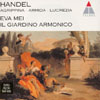Handel Solo Cantatas
Mei's colourful and exciting style, supported by the equally dare-devil Giardino Armonico, occasionally strays a shade too far
View record and artist detailsRecord and Artist Details
Composer or Director: George Frideric Handel
Label: Das Alte Werk
Magazine Review Date: 4/2000
Media Format: CD or Download
Media Runtime: 55
Mastering:
DDD
Catalogue Number: 3984-24571-2

Tracks:
| Composition | Artist Credit |
|---|---|
| Agrippina condotta a morire, 'Dunque sarà pur ve |
George Frideric Handel, Composer
(Il) Giardino Armonico Ensemble Eva Mei, Soprano George Frideric Handel, Composer Giovanni Antonini, Conductor |
| Armida abbandonata |
George Frideric Handel, Composer
(Il) Giardino Armonico Ensemble Eva Mei, Soprano George Frideric Handel, Composer Giovanni Antonini, Conductor |
| (La) Lucrezia |
George Frideric Handel, Composer
(Il) Giardino Armonico Ensemble Eva Mei, Soprano George Frideric Handel, Composer Giovanni Antonini, Conductor |
Author: Stanley Sadie
Handel is at his most dramatic, his most tragic, in these three remarkable cantatas about women in extremis - one condemned, one abandoned, one raped. Eva Mei has no compunction about bringing to them the full expressive apparatus of an opera singer - as no doubt the singers of Handel's day did, too, although their apparatus may have been based on rather different premises. Mei sings fearlessly, using a very wide dynamic range, a powerful attack, a good deal of rhythmic freedom in the recitative, and risking the occasional ugliness of sound to drive home the drama. It's a very exciting performance and it certainly makes one think afresh about the pallid 'stylish' readings we are sometimes offered.
Her approach is matched by that of the Giardino Armonico group which gives no less forceful an account of the instrumental music. The continuo part, with an unusual fullness of sound, is very vigorously done, while the string playing doesn't stop short of rasp and roughness to drive home the expressive points - listen to the energetic bass arpeggios in the first aria of Agrippina. The big central aria here, 'Come, o Dio', is rapt, very slow, very soft, and in its way very moving.
Mei brings no less passion to Armida: the accompaniment to 'Ah! crudele' is almost voluptuous, the ensuing recitative is duly furious (Handel marked the string parts 'furioso') and thrilling; and she rages in the aria 'Venti, fermate', stopping just short of coarseness of sound. Lucrezia, which has only continuo accompaniment, puts more stress on the singer, and Mei comes a little too close to the world of Puccini here with some rather hectic patches of singing in which her intonation is sometimes tested. But the final aria is certainly very moving.
In sum, these performances do offer a new perspective on the music, and it is good to hear a singer and players who are uninhibited by stylistic boundaries; but I think that most listeners wanting these particular cantatas will be likely to prefer the versions by Veronique Gens.'
Her approach is matched by that of the Giardino Armonico group which gives no less forceful an account of the instrumental music. The continuo part, with an unusual fullness of sound, is very vigorously done, while the string playing doesn't stop short of rasp and roughness to drive home the expressive points - listen to the energetic bass arpeggios in the first aria of Agrippina. The big central aria here, 'Come, o Dio', is rapt, very slow, very soft, and in its way very moving.
Mei brings no less passion to Armida: the accompaniment to 'Ah! crudele' is almost voluptuous, the ensuing recitative is duly furious (Handel marked the string parts 'furioso') and thrilling; and she rages in the aria 'Venti, fermate', stopping just short of coarseness of sound. Lucrezia, which has only continuo accompaniment, puts more stress on the singer, and Mei comes a little too close to the world of Puccini here with some rather hectic patches of singing in which her intonation is sometimes tested. But the final aria is certainly very moving.
In sum, these performances do offer a new perspective on the music, and it is good to hear a singer and players who are uninhibited by stylistic boundaries; but I think that most listeners wanting these particular cantatas will be likely to prefer the versions by Veronique Gens.'
Discover the world's largest classical music catalogue with Presto Music.

Gramophone Digital Club
- Digital Edition
- Digital Archive
- Reviews Database
- Full website access
From £8.75 / month
Subscribe
Gramophone Full Club
- Print Edition
- Digital Edition
- Digital Archive
- Reviews Database
- Full website access
From £11.00 / month
Subscribe
If you are a library, university or other organisation that would be interested in an institutional subscription to Gramophone please click here for further information.





